You must be BORN AGAIN!
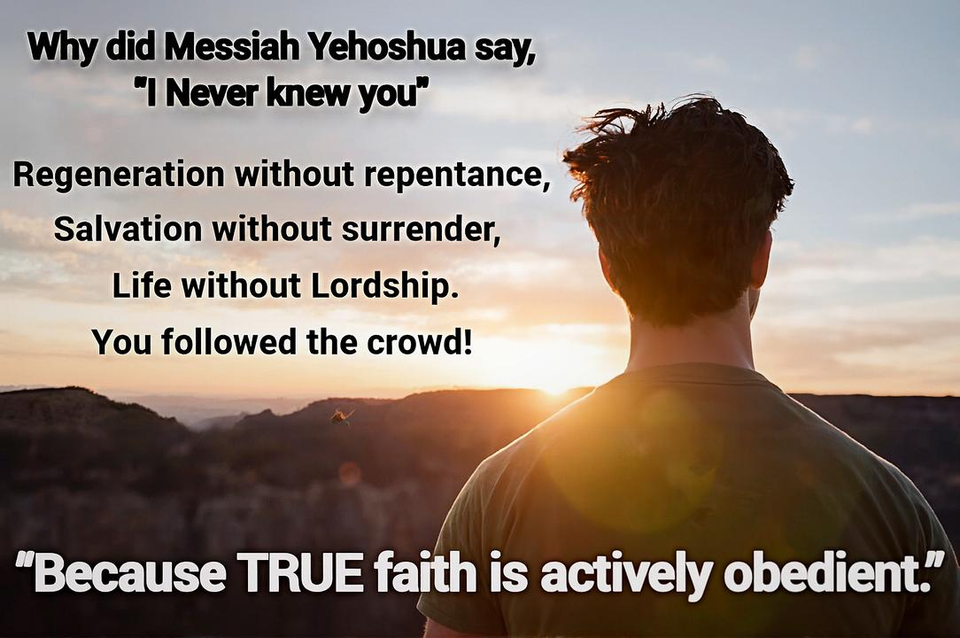
How Do I Enter the Kingdom of Avinu Elohei?
Y’hoshua answered, “Don’t be surprised that I said to you, ‘You must be born again.’”
— Yochanan [John] 3:7 (CJB)
The Question That Determines Eternity
From the beginning of creation, Avinu Elohei desired fellowship with humanity. Yet sin brought separation, darkness, and death. The question remains as vital today as it was when Nakdimon (Nicodemus) came to Y’hoshua under cover of night:
“How do I enter the Kingdom of Avinu Elohei?”
Y’hoshua’s answer was simple yet profound: “You must be born again.” This rebirth is not physical but spiritual — a total renewal of life, heart, and spirit through obedience to His Word and the indwelling of the Ruach HaKodesh.
To be born again is to begin a new existence under the reign of HaMashiach, walking no longer in the desires of the flesh but in the light of TORAH and the guidance of the Spirit.
The Steps to Enter the Kingdom
“Kefa said to them, ‘Repent, and let each one of you be immersed in the Name of יהושע (Y’hoshua) HaMashiach for the forgiveness of sins, and you shall receive the gift of the Ruach HaKodesh.’”
— Ma’asei HaShlichim [Acts] 2:38 (TS2009)
A. True and Full Repentance, Immersion, and Receiving the Ruach
Entrance into the Kingdom of Avinu Elohei begins with three inseparable steps:
- Teshuvah (Repentance): Turning completely from sin and submitting to Y’hovah’s authority.
- Tevilah (Immersion/Baptism): Being immersed on the authority of Y’hoshua HaMashiach for the forgiveness of sins.
- Receiving the Ruach HaKodesh (Holy Spirit): The divine indwelling that seals and empowers each talmid as part of the Body of Mashiach.
Through obedience to Y’hoshua’s command in Yochanan [John] 3:7 and its fulfillment in Acts 2:38, we become reborn — renewed by Spirit and cleansed by the water of the Word.
B. Being Born Again Is Only the Beginning
“Therefore, my beloved, as you have always obeyed... work out your own salvation with fear and trembling.”
— Philippians 2:12 (CJB)
The moment of rebirth marks the beginning of a lifetime of discipleship. Each talmid (disciple) must grow in knowledge, wisdom, and grace through the Son of Avinu Elohei, Y’hoshua HaMashiach.
Faith is not a one-time confession but an ongoing journey of obedience to TORAH, bearing fruit that shows true transformation. As written:
“For this is the love for Elohim, that we guard His commands. And His commands are not heavy.”
— 1 Yoḥanan [1 John] 5:3 (TS2009)
C. Holding Fast to the True Emunah (Faith)
“Loved ones, I felt it necessary to write to you urging you to continue to contend for the Emunah which was once for all handed down to the kedoshim.”
— Yehudah [Jude] 1:3 (TS2009)
Every talmid of Y’hoshua must recognize the foundational truths of the Torah and the Brit Chadashah (Renewed Covenant). The faith once delivered is not to be reshaped by men but preserved in its purity — the sound doctrine proclaimed by the Scriptures and confirmed by the Ruach.
D. A Call to the Reader
If your heart is stirred, seek understanding through prayer, repentance, and study of His Word.
Reach out with any questions as you walk this journey toward spiritual rebirth and discipleship:
Rabbi Francisco Arbas
📧 franciscoarbas.yisrael@gmail.com
To be born again is to obey the divine pattern revealed in Acts 2:38 — Repent, be immersed, and receive the Ruach HaKodesh.
This is the doorway to the Kingdom of Avinu Elohei, and the beginning of a new life of faithful obedience under the reign of Y’hoshua HaMashiach.
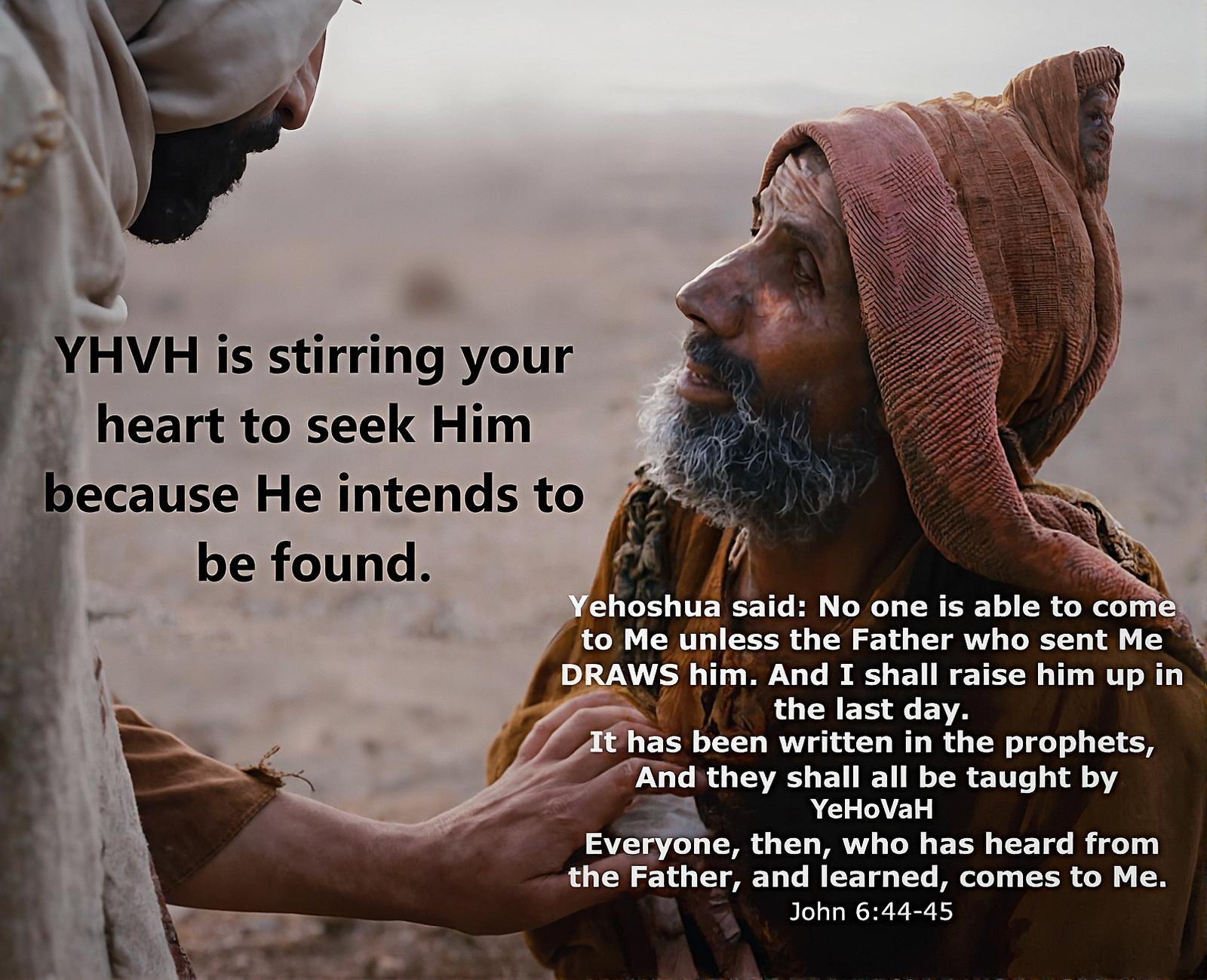
Disobedience of Man
The Separation Between Humanity and Avinu Elohei
“For the wages of sin is death, but the gift of Elohim is eternal life in Y’hoshua HaMashiach our Adon.”
— Romiyim [Romans] 6:23 (TS2009)
The Fall in the Garden — Humanity’s First Disobedience
From the beginning, Avinu Elohei provided everything mankind needed to live in harmony with Him. Adamah (Adam) and Chavah (Eve) walked in His presence, surrounded by provision, peace, and perfection.
“And Elohim blessed them, and Elohim said to them, ‘Be fruitful and increase, and fill the earth and subdue it; and rule over the fish of the sea, and over the birds of the heavens, and over all the creatures moving on the earth.’”
— Berĕshith [Genesis] 1:28–29 (TS2009)
In Gan-Eden (the Garden of Eden), Avinu Elohei gave a single command:
“And YHVH Elohim commanded the man, saying, ‘Eat of every tree of the garden, but do not eat of the tree of the knowledge of good and evil, for in the day that you eat of it, you shall certainly die.’”
— Berĕshith [Genesis] 2:16–17 (TS2009)
When Chavah listened to the serpent and disobeyed, she gave the fruit to Adamah, who also transgressed. Their rebellion broke the intimate fellowship with Avinu Elohei and introduced sin into the world.
“But your iniquities have separated between you and your Elohim, and your sins have hidden His face from you, from hearing.”
— Yesha’yahu [Isaiah] 59:2 (TS2009)
Sin entered, bringing death — not only physical but spiritual — severing mankind from the presence of Elohim.
Avinu Elohei’s Holiness and Righteous Judgment
Because Avinu Elohei is holy, He cannot dwell with sin. The disobedience of Adamah and Chavah led to judgment:
- The serpent was cursed (Berĕshith [Genesis] 3:14).
- Chavah was told her sorrow and conception would multiply (Genesis 3:16).
- Adamah was cursed to toil for his provision (Genesis 3:17–19).
- Humanity was expelled from the Garden, separated from the Tree of Life (Genesis 3:23–24).
The holiness of Y’hovah demands obedience. Therefore, disobedience brought consequence — yet even within judgment, there was mercy.
Avinu Elohei Desires Obedience
The commandments given to Yisrael reveal the heart of our Father — He desires love expressed through obedience.
“And you shall love YHVH your Elohim with all your heart, and with all your soul, and with all your might.”
— Devarim [Deuteronomy] 6:5 (TS2009)
“Therefore, you shall love Y’hovah your Elohim, and guard His charge, and His laws, and His right-rulings, and His commands always.”
— Devarim [Deuteronomy] 11:1 (TS2009)
“Rather, this is what I ordered them, saying, ‘Obey My voice, and I shall be your Elohim, and you be My people. And walk in all the ways that I have commanded you, so that it be well with you.’”
— Yirmeyahu [Jeremiah] 7:23 (TS2009)
Disobedience is sin; obedience is love. To walk in TORAH (His instructions) is to walk in a relationship with Avinu Elohei.
The Promise of Redemption — Mercy in the Midst of Judgment
Even as He pronounced judgment, Avinu Elohei (Our Father, God) revealed His plan of mercy and redemption.
“And I put enmity between you and the woman, and between your seed and her Seed. He shall crush your head, and you shall crush His heel.”
— Berĕshith [Genesis] 3:15 (TS2009)
Here lies the first prophecy of the coming Redeemer — the Seed of the woman who would destroy the serpent’s power. Though wounded in the process (“you shall crush His heel”), He would triumph over Satan (“He shall crush your head”).
This verse is the earliest announcement of Y’hovah’s redemptive plan through HaMashiach, foreshadowing Y’hoshua who would come to reconcile mankind to Avinu Elohei.
The Meaning of “Mashiach”
The Hebrew word Mashiach (מָשִׁיחַ) literally means “anointed one.”
It derives from the root mashach — “to smear or anoint.” In Scripture, mashiach always refers to a person anointed for a sacred purpose — a priest, prophet, or king chosen by Elohim.
Thus, Y’hoshua HaMashiach is the One anointed by Avinu Elohei to fulfill the eternal covenant of redemption.
“He Himself bore our sins in His body on the tree, so that we, having died to sins, might live unto righteousness — by whose stripes you were healed.”
— 1 Kefa [1 Peter] 2:24 (TS2009)
Through His obedience unto death, Y’hoshua restored what Adamah’s disobedience destroyed.
The Redeemer Foretold Before Time
Avinu Elohei’s plan of salvation was not a reaction but an eternal design — established before the foundation of the world.
“He was foreknown before the foundation of the world, but was manifested in these last times for your sakes.”
— 1 Kefa [1 Peter] 1:20 (TS2009)
Thus, from the garden to the stake, the hand of Y’hovah was working redemption for all who would believe and obey His Son.
The disobedience of Adamah brought separation, but the obedience of Y’hoshua opened the way for restoration.
We will examine the first command of that restoration — Teshuvah (Repentance) — and see how Y’hoshua, His talmidim, and the early believers proclaimed the same message: “Repent, for the Kingdom of Heaven is near.”
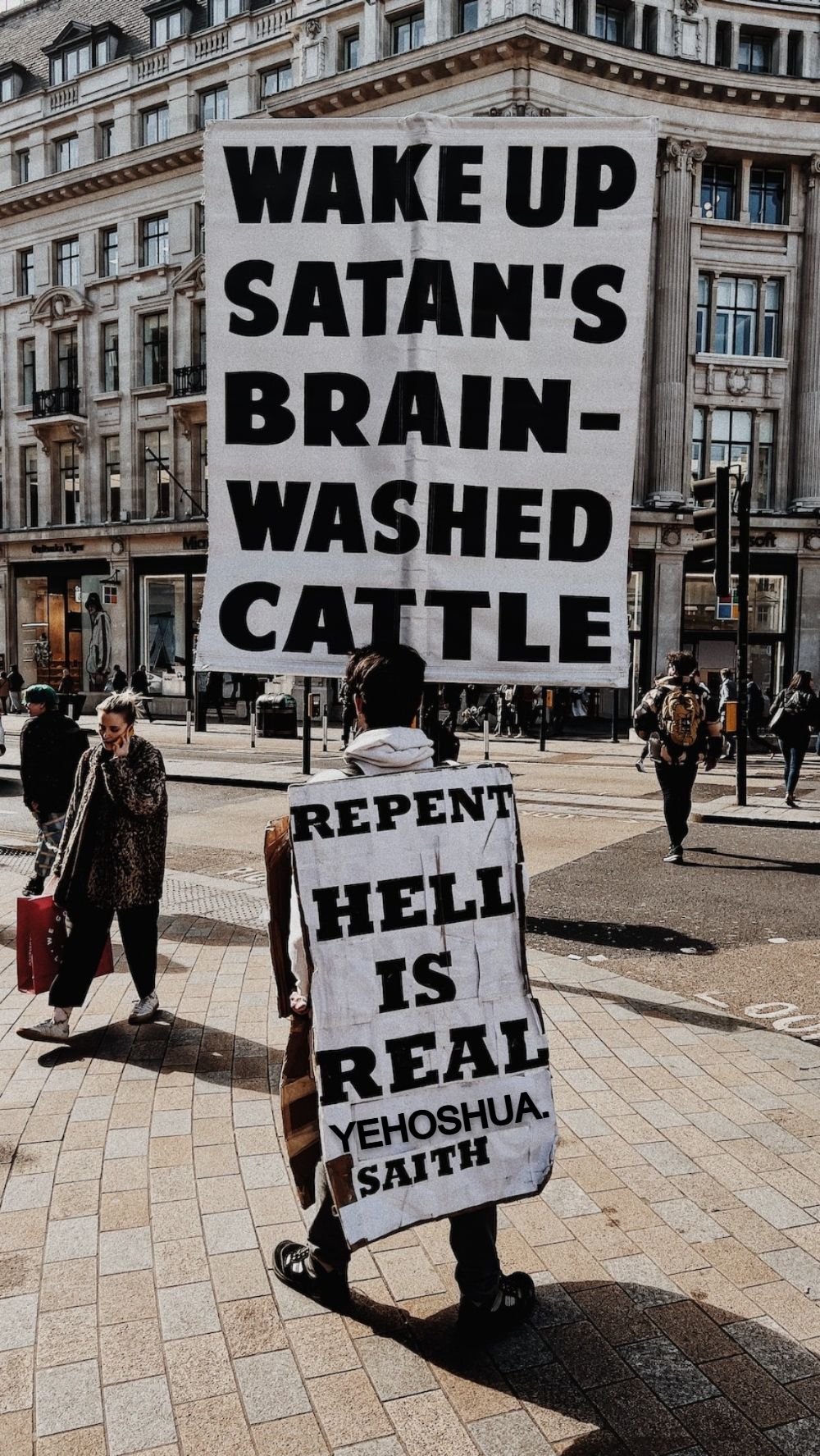
Teshuvah: The First Step of the New Birth
Turning from Sin and Returning to Avinu Elohei
“Turn to Me, and be saved, all you ends of the earth! For I am El, and there is none else.”
— Yesha’yahu [Isaiah] 45:22 (TS2009)

Hell Is Real — Repent!
“Turn from sin (repent), and let each one of you be immersed in the Name of יהושע HaMashiach for the forgiveness of sins. And you shall receive the gift of the Ruach HaKodesh.”
— Ma’asei HaShlichim [Acts] 2:38 (TS2009)
The message of the early believers was not one of comfort or convenience but of urgent repentance. The call to teshuvah — to turn from sin and return to Avinu Elohei — is the first act of true faith.
Sin separates the soul from Elohim, but repentance restores the relationship. It is more than sorrow or regret; it is a complete turning of heart, mind, and direction.
Y’hoshua Taught Repentance
“The time has come; the Kingdom of Elohim has come near! Repent, and believe in the Good News.”
— Markos [Mark] 1:15 (CJB)
“From that time on, Y’hoshua began proclaiming, ‘Repent! For the Kingdom of Heaven is near!’”
— Mattityahu [Matthew] 4:17 (CJB)
“No, I tell you. Rather, unless you turn from your sins, you will all die as they did!”
— Luqas [Luke] 13:3 (CJB)
Y’hoshua’s first and continuing message was repentance. Before signs, before miracles, before teaching in parables — He commanded: “Repent.”
True teshuvah begins when we confront sin honestly and turn fully toward obedience.
“But if the wicked turns from all his sins which he has committed, and he guards all My laws and does right and righteousness, he shall certainly live; he shall not die.”
— Yeḥezqel [Ezekiel] 18:21 (TS2009)
“He who conceals his sins does not prosper, but whoever confesses and forsakes them finds compassion.”
— Mishlĕ [Proverbs] 28:13 (TS2009)
Who Is Y’hoshua Calling?
“I have not come to call the righteous, but sinners to repentance.”
— Luqas [Luke] 5:32 (CJB)
All humanity has sinned and fallen short of Y’hovah’s perfection. There is no one righteous by their own works or merits.
“There is no one righteous, not even one! No one understands, no one seeks Elohim... all have turned aside.”
— Romiyim [Romans] 3:10–12 (CJB)
“A brutish fool says in his heart, ‘There is no Elohim.’ They have done abominable deeds; none does good. Elohim looked down from the heavens to see if there was one who understood, who sought Elohim. They have all turned aside.”
— Tehillim [Psalms] 53:1–3 (TS2009)
Therefore, Y’hoshua came to call sinners — not to excuse sin, but to cleanse and restore.
What Is Sin?
“Everyone doing sin also does lawlessness, and sin is lawlessness.”
— 1 Yoḥanan [1 John] 3:4 (TS2009)
Sin is a violation of TORAH — rebellion against the loving instructions of Avinu Elohei.
To be “lawless” (anomia in Greek, b’li-Torah in Hebrew concept) is to live apart from His divine order.
“So then, anyone who knows the right thing to do and fails to do it is committing a sin.”
— Ya’akov [James] 4:17 (CJB)
“Behold, all lives are Mine... the being who sins shall die.”
— Yeḥezqel [Ezekiel] 18:4 (TS2009)
Sin results in death — first spiritual, then eternal — unless cleansed by the blood of the Lamb.
“Just as it is appointed for men to die once, but after this the judgment.”
— Ivrim [Hebrews] 9:27 (TS2009)
“And death and Sh’ol were thrown into the lake of fire. This is the second death.”
— Ḥazon [Revelation] 20:14 (TS2009)
Godly vs. Worldly Repentance
“For sadness used as Elohim intended brings a turning from sin to deliverance, and there is nothing to regret in that! But worldly sadness brings death.”
— 2 Corinthians 7:10 (CJB)
True teshuvah is not emotional guilt — it is transformation and a change of mind. The Ruach convicts, we respond, and obedience follows.
Worldly sorrow feels regret; godly sorrow bears fruit.
David exemplified godly repentance:
“For Your arrows have sunk deep in me... my iniquities rise over my head. I am bent over and bowed down greatly; I go mourning all day long.”
— Tehillim [Psalms] 38:2–6 (TS2009)
“I confess my crookedness; I am sorry for my sin.”
— Tehillim [Psalms] 38:18 (TS2009)
Repentance Leads to Transformation
“Don’t you know that the unrighteous will not inherit the Kingdom of Elohim?... such were some of you; but you were washed, you were made set-apart, you were declared right in the Name of the Adon Y’hoshua and by the Spirit of our Elohim.”
— 1 Corinthians 6:9–11 (TS2009)
Repentance is the doorway to holiness. When we confess and turn, Avinu Elohei not only forgives — He transforms. The same Ruach who convicts us of sin also empowers us to walk in righteousness.
Teshuvah prepares the heart for the next step — Tevilah (Immersion/Baptism) — the outward sign of inward cleansing, and the burial of the old self.
Next, we’ll explore the meaning of immersion as taught by Y’hoshua, practiced by His talmidim, and commanded for all who seek to be truly born again.
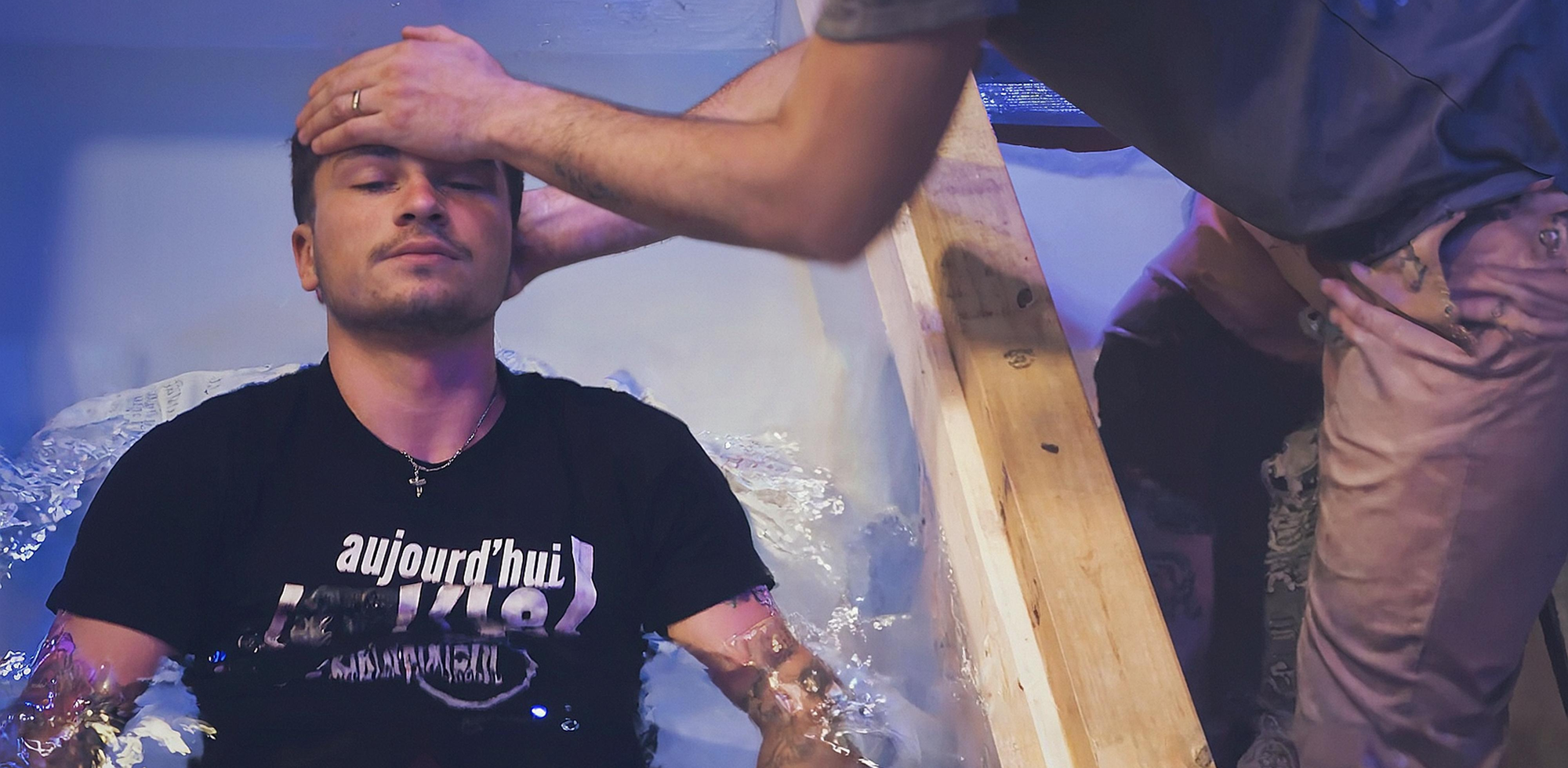
Tevilah: Immersion and Identification with Mashiach
Buried with Him, Raised to New Life
“Y’hoshua answered, ‘Yes, indeed, I tell you that unless a person is born of water and the Ruach, he cannot enter the Kingdom of Elohim.’”
— Yochanan [John] 3:5 (CJB)
The Covenant of the Waters — Tevilah in Torah and Messiah
The act of tevilah (immersion) is not a Christian invention but a continuation of a Torah pattern of cleansing, renewal, and covenant.
Under Torah, mikveh immersions were required for ritual purification and preparation for service before Y’hovah (see Vayikra [Leviticus] 14–16).
Y’hoshua’s command for His talmidim to be immersed was a spiritual fulfillment of this ancient practice — not merely symbolic, but covenantal.
It represents the burial of the old self and the beginning of a new life led by the Ruach HaKodesh.
“Through immersion into His death, we were buried with Him, so that just as through the glory of the Father, the Messiah was raised from the dead, likewise we too might live a new life.”
— Romiyim [Romans] 6:4 (TS2009)
Obedience to Y’hoshua’s Command
“Go, therefore, and make talmidim of all the nations, immersing them in the Name of the Father, and of the Son, and of the Ruach HaKodesh.”
— Mattityahu [Matthew] 28:19 (TS2009)
Y’hoshua instructed His talmidim to teach and immerse. This command was first carried out in Acts 2:38, when Kefa declared that immersion into the Name of Y’hoshua HaMashiach brings forgiveness of sins and reception of the Ruach HaKodesh.
To be immersed “into the Name” is not a formula of words, but a declaration of authority and belonging — identifying fully with the person and work of Y’hoshua.
“And he ordered them to be immersed in the Name of Y’hoshua HaMashiach.”
— Ma’asei HaShlichim [Acts] 10:48 (TS2009)
The Spiritual Reality — Applying the Blood Through His Name
Water alone does not cleanse the soul; it is faith in Y’hoshua’s blood and His authority that washes away sin.
When one is immersed in His Name, the “blood of the Lamb” is applied spiritually — forgiveness becomes reality through obedience.
“In whom we have redemption through His blood, the forgiveness of sins, according to the riches of His grace.”
— Ephesians 1:7 (TS2009)
“There is salvation in no one else! For there is no other Name under heaven given among men by which we must be saved.”
— Ma’asei HaShlichim [Acts] 4:12 (CJB)
To be born of water is to die to the old life and be buried with Mashiach.
To be born of Spirit is to rise into new life with the seal (sanctification) of His Ruach.
The Testimony of the Prophets and the Apostles
The message of immersion in the Name of Y’hoshua echoes throughout the early believers’ teachings:
“For until then, they had only been immersed in the Name of the Adon Y’hoshua.”
— Ma’asei HaShlichim [Acts] 8:16 (TS2009)
“On hearing this, they were immersed into the Name of the Adon Y’hoshua.”
— Acts 19:5 (CJB)
“As many of you as were immersed into the Messiah have clothed yourselves with the Messiah.”
— Galatim [Galatians] 3:27 (TS2009)
Each passage reinforces that immersion is not optional — it is a command of obedience that identifies every believer with the death, burial, and resurrection of Y’hoshua.
The Mystery of the Name — Y’hoshua, Salvation of Y’hovah
The Name Y’hoshua (יהושע) means “Y’hovah is salvation.” It is not merely a title, but the revelation of the Redeemer’s purpose.
Through this Name, the power of atonement is made manifest:
“Everyone who calls on the Name of Y’hovah shall be saved.”
— Yo’el [Joel] 2:32 (TS2009); cf. Acts 2:21
“All the prophets bear witness to Him, that everyone who puts their trust in Him receives forgiveness of sins through His Name.”
— Acts 10:43 (CJB)
When we are immersed in His Name, we publicly declare:
“Y’hovah has saved me through His Mashiach.”

The Blood and the Water — A Unified Witness
“This is the One who came by water and blood — Y’hoshua HaMashiach; not only by water, but by water and blood. And the Ruach is the One who bears witness, because the Ruach is the truth.”
— 1 Yoḥanan [1 John] 5:6 (TS2009)
Water, blood, and Spirit — three witnesses testify of our rebirth.
The water cleanses, the blood redeems, and the Spirit sanctifies.
Together, they mark the complete restoration of a soul reborn into covenant life with Avinu Elohei.
Tevilah is the burial of the old self and the birth of the new creation. Yet Y’hoshua’s command did not end there — for He promised that the Ruach HaKodesh would fill and empower all who obey.
Next, we will explore the gift of the Spirit — the very breath of Elohim — and how the early believers experienced and taught the immersion of the Ruach HaKodesh.
Receiving the Ruach HaKodesh
The Promise of Power and Presence
“But you will receive power when the Ruach HaKodesh has come upon you; and you will be my witnesses in Yerushalayim, in all Y’hudah and Shomron, and to the ends of the earth.”
— Ma’asei HaShlichim [Acts] 1:8 (CJB)
The Gift Promised by Y’hoshua
Before ascending, Y’hoshua instructed His talmidim to wait in Yerushalayim until they received the “promise of the Father.” This promise was not abstract — it was the indwelling Ruach HaKodesh, the very Spirit of Elohim.
“And see, I am sending the promise of My Father upon you. But you are to stay in the city of Yerushalayim until you have been clothed with power from on high.”
— Luqas [Luke] 24:49 (TS2009)
“For Yochanan immersed with water, but you shall be immersed in the Ruach HaKodesh not many days from now.”
— Acts 1:5 (TS2009)
The Ruach was given not only for comfort but also for empowerment — enabling the talmidim to live holy lives and boldly proclaim the Besorah (Good News).
The Outpouring at Shavuot (Pentecost)
“And when the day of Shavu‘ot had come, they were all with one mind in one place. And suddenly there came a sound from the heaven, as of a rushing mighty wind, and it filled all the house where they were sitting.”
— Ma’asei HaShlichim [Acts] 2:1–2 (TS2009)

As Y’hoshua promised, the Ruach descended with power. Tongues of fire rested upon each believer, symbolizing purification and divine anointing. They began to speak in languages they had not known — a supernatural sign to the gathered nations that the Spirit of Y’hovah had come.
“And they were all filled with the Ruach HaKodesh and began to speak with other tongues, as the Spirit gave them to speak.”
— Acts 2:4 (TS2009)
This event fulfilled the prophecy given through the prophet Yo’el:
“And after this it shall be that I pour out My Spirit on all flesh. And your sons and your daughters shall prophesy, your old men dream dreams, your young men see visions.”
— Yo’el [Joel] 2:28 (TS2009); cf. Acts 2:16–18
The Same Message of Salvation
After the outpouring, Kefa (Peter) stood and declared the message of salvation — the same pattern Y’hoshua taught:
“Repent, and let each one of you be immersed in the Name of Y’hoshua HaMashiach for the forgiveness of sins, and you shall receive the gift of the Ruach HaKodesh.”
— Acts 2:38 (TS2009)
This was not a new teaching. It was the continuation of Y’hoshua’s own command in Yochanan [John] 3:5 — to be born of water and Spirit.
The Ruach HaKodesh is the seal of that rebirth — confirming that one belongs to Y’hovah and walks in His covenant.
The Witness of the Prophets and Apostles
The Spirit of Y’hovah has always been His mark of ownership upon His people:
“And I shall put My Spirit within you and cause you to walk in My laws, and you shall guard My right-rulings and shall do them.”
— Yeḥezqel [Ezekiel] 36:27 (TS2009)
Through the Ruach, the commandments move from stone tablets into living hearts.
The same Spirit that hovered over creation, inspired the prophets, and raised Y’hoshua from the dead now dwells within those who obey Him.
“And we are His witnesses to these matters, and so also is the Ruach HaKodesh whom Elohim has given to those who obey Him.”
— Acts 5:32 (TS2009)
The Evidence of the Spirit
Throughout Ma’asei HaShlichim (Acts), the indwelling of the Ruach was accompanied by visible signs — boldness, prophecy, languages, joy, and transformation.
But the greatest evidence is the fruit of holiness — a life conformed to Y’hoshua.
“But the fruit of the Spirit is love, joy, peace, patience, kindness, goodness, trustworthiness, gentleness, self-control. Against such there is no Torah.”
— Galatim [Galatians] 5:22–23 (TS2009)
These fruits testify that the believer’s life is no longer ruled by the flesh, but by the Ruach of Y’hovah.

Born of the Spirit
Y’hoshua compared the working of the Ruach to the unseen wind:
“The wind blows where it wishes, and you hear the sound of it, but cannot tell where it comes from and where it goes. So is everyone who has been born of the Spirit.”
— Yochanan [John] 3:8 (TS2009)
The Spirit moves sovereignly, changing hearts, empowering lives, and revealing truth.
Those who are “born of the Spirit” live by faith, walk in obedience, and bear witness to the power of Y’hovah.
The Ruach HaKodesh is the living presence of Y’hovah within His people — guiding, convicting, and empowering them to fulfill His purpose.
In our last segment, we will conclude this teaching with the call to live as reborn talmidim — walking in lifelong discipleship, obedience to TORAH (His complete Word, from Berĕshith (Genesis) to Ḥazon (Revelation)), and spiritual maturity in Y’hoshua HaMashiach.
A New Life in Mashiach
Walking as Reborn Talmidim
“Therefore, if anyone is in Mashiach, he is a new creation — old matters have passed away; see, all matters have become renewed!”
— 2 Corinthians 5:17 (TS2009)
Born Again — The Beginning of a Lifelong Journey
To be born again is not the end of faith or walking the rest of your life your way, but the beginning of a transformed life. It is the moment of spiritual awakening — when the heart of stone becomes a heart of flesh, and the Spirit of Y’hovah writes His Torah within us.
“And I shall give you a new heart and put a new Spirit within you; and I shall take the heart of stone out of your flesh, and I shall give you a heart of flesh.”
— Yeḥezqel [Ezekiel] 36:26 (TS2009)
Those who are reborn must now walk in the Derekh (Way) of Y’hoshua — a life of continual surrender, obedience, and growth.
Working Out Our Salvation
“Therefore, my beloved, as you have always obeyed... work out your own deliverance with fear and trembling.”
— Philippians 2:12 (TS2009)
Being born again begins the process of talmidut — discipleship.
Each talmid is called to daily die to self, live in humility, and mature in the knowledge of Y’hoshua HaMashiach.
“Until we all come to the unity of the faith and of the knowledge of the Son of Elohim, to a perfect man, to the measure of the stature of the fullness of Mashiach.”
— Ephesians 4:13 (TS2009)
Growth is the evidence of life. A tree that does not bear fruit has not truly taken root.
So too, those reborn by the Spirit are expected to produce the fruit of righteousness through obedience to TORAH and love for others.
“For this is the love for Elohim, that we guard His commands. And His commands are not heavy.”
— 1 Yoḥanan [1 John] 5:3 (TS2009)
The Fruit of a Reborn Life
A born-again believer reflects the character of Mashiach — a life shaped by the Spirit rather than the flesh.
“But the fruit of the Spirit is love, joy, peace, patience, kindness, goodness, trustworthiness, gentleness, self-control. Against such there is no Torah.”
— Galatim [Galatians] 5:22–23 (TS2009)
This fruit does not grow overnight; it matures through consistent obedience, repentance, and faithfulness in trials.
True discipleship is a lifelong journey of conforming to Y’hoshua’s image.
“Whoever says he stays in Him ought himself also to walk, even as He walked.”
— 1 Yoḥanan [1 John] 2:6 (TS2009)

The Call to Lifelong Discipleship
The call of Y’hoshua is not simply to believe, but to follow.
“If anyone wishes to come after Me, let him deny himself, and take up his stake daily, and follow Me.”
— Luqas [Luke] 9:23 (TS2009)
To follow Y’hoshua is to live as He lived — humble, obedient, compassionate, and faithful to the will of our Father.
Being born again is not merely escaping judgment; it is entering covenant partnership with Y’hovah to serve His purposes on earth.
Each talmid becomes a living testimony that Y’hovah still redeems and transforms lives through His Son.
A Renewed Mind and Purpose
“Do not be conformed to this world, but be transformed by the renewing of your mind, so that you prove what is the good and well-pleasing and perfect desire of Elohim.”
— Romiyim [Romans] 12:2 (TS2009)
Being born again gets us into Elohei's Kingdom. Rebirth puts us on the derekh (WAY) of discipleship that changes how we think, speak, and act. The renewed mind seeks TORAH, desires righteousness, and rejects compromise.
No longer enslaved to sin, the disciple now lives as a vessel of light in a darkened world — empowered by the Ruach to walk in truth.
Until Mashiach Returns
As we await the glorious return of Y’hoshua, we must continue in holiness and perseverance.
The same Spirit that raised Him from the dead empowers us to endure faithfully until the end.
“He who endures to the end shall be saved.”
— Mattityahu [Matthew] 24:13 (TS2009)
Our hope is not in this world or its systems, but in the Kingdom of Avinu Elohei, which by the Spirit is within you.
Until then, may our lives bear witness that we have truly been born of water and Spirit — transformed by His grace and set apart for His glory.
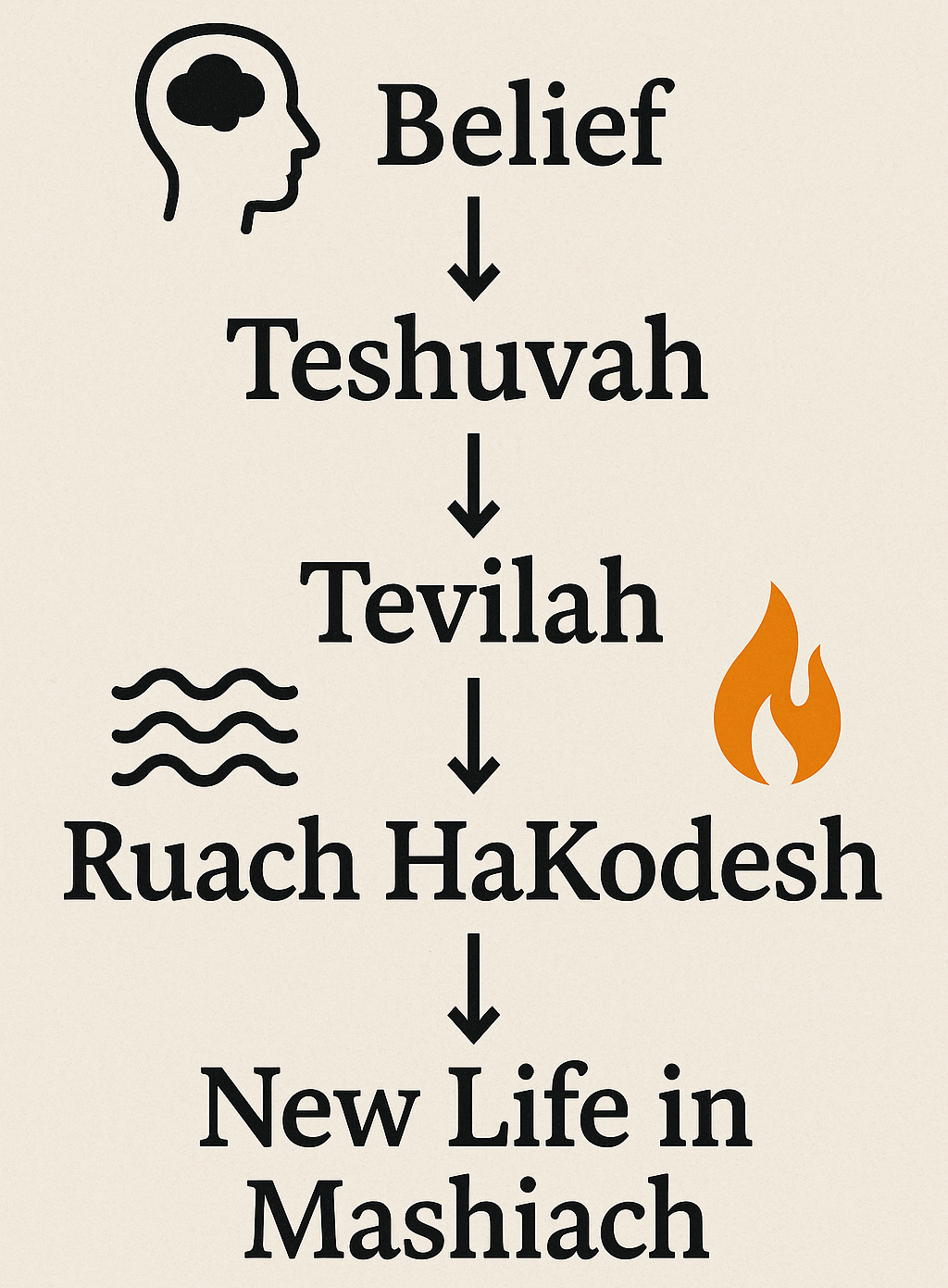
Beloved, being born again is not a momentary feeling but a covenant reality.
It is the rebirth of your spirit, the renewal of your heart, a change of mind, and the beginning of a lifelong journey of obedience and love.
Walk as a reborn talmid. Let the Ruach HaKodesh lead you.
And may the light of Y’hoshua HaMashiach shine through you — until He returns in glory.
By Rabbi Francisco Arbas
📧 franciscoarbas.yisrael@gmail.com
Following His ‘WAY’ — Netzari Mashiach Judaism
Website usage statement: At Netzarim Talmidim Ministry, we do not sell anything, nor do we sell knowledge. No emails are sold to anyone. No ads, no commercials, or anything of that nature can be found on this website. This website is not sponsored by any commercial, advertising, state, or any other entity of a similar nature. This ministry does not receive any credits or financial gain from any institution, religious or secular. No cookies or tracking activity is conducted on this website—no Terms and Conditions policy. No donations are asked. We are not a 501(c)(3) government organization. The many hours of work that went into producing and continue to produce this informational website are for you and entirely free! Made to uplift and inform individuals of our great Avinu Elohei and our Rabbi Y'hoshua Ben Y'hovah. The reader may distribute the posted materials freely, unchanged, without the author’s permission, but credit must be given to the author.
We ask that you pray for this ministry, that our outreach will grow on the internet. Please subscribe to this website to receive our weekly teachings.